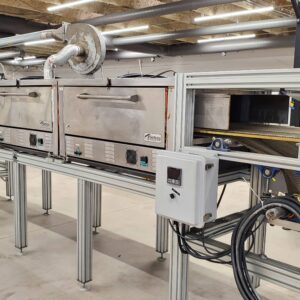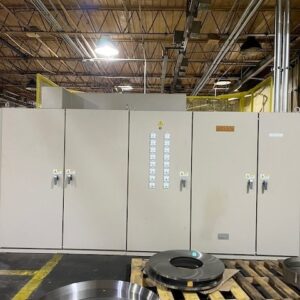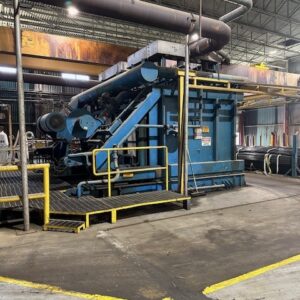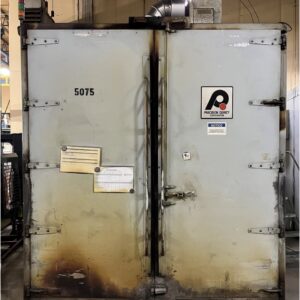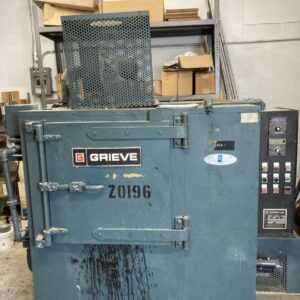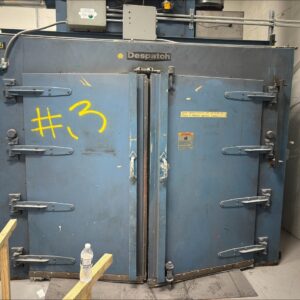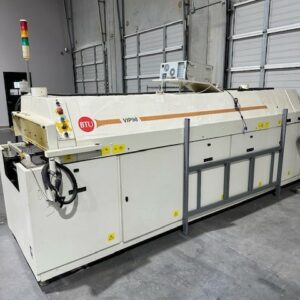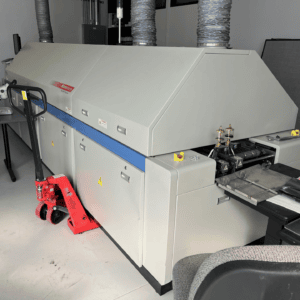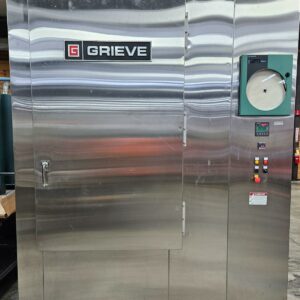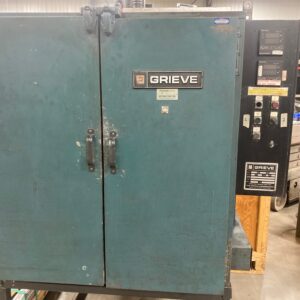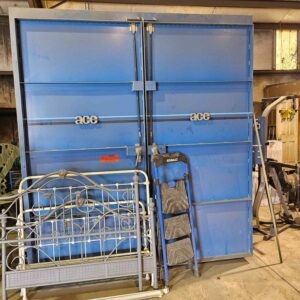Used Industrial Ovens For Sale
View a range of used Ovens for sale from Revelation Machinery, here. We look forward to assisting you to find the equipment for your needs. If you don’t find the industrial oven you are looking for, please contact us!
Revelation Machinery can always help you find what you need! If you have any questions about industrial ovens or need to find a specific brand/type, please feel free to contact us! If you need to sell your used industrial furnaces, do so here!
Found Results
Industrial Furnaces and Ovens
The primary use of industrial furnaces is the treatment of metal materials. Sometimes other materials are treated, such as ceramics and glass. Industrial furnaces reach temperatures of 2000°F (1093°C) or higher to create a reaction in treated metals. Industrial ovens operate at much lower temperatures, typically lower than 750°F (400°C). You can view our inventory of used industrial ovens here.
Common brands include Andritz Metals, Benko Products, Despatch Thermal Processing Technology, Inductotherm, Ispen, ITC, N. Ferrara Furnace, RIFCO Industrial Furnaces, SentroTech, Tenova, The Furnace Source, Thyssenkrupp, and Xinyu Technologies.
Types
The types vary based on several factors, including application type (covered in more detail below), fuel, temperature range, and the method of heat introduction to treated materials. They operate using electricity, natural gas, propane, coal, or other fossil or non-fossil fuel.
While there are several types, we provide additional details on more popular high-temperature furnaces. Others include Atmosphere, Batch Systems, Bell & Elevator, Belt, Blast, Continuous Systems, Conveyor, Internal Quench, Laboratory, Multiple Hearth, Pit, Pusher, Raised Hearth, Rotary, Roller Hearth, Shell Baking, Slot Forge, and Tube.
- Box Furnaces: High-temperature processes like heat treating, calcining, tempering, and more are ideal. They are known as ash furnaces when used in a laboratory setting. A variety of configurations include swing and vertical lift doors, single and multi-zone chambers, and heat ranges from 1850°F (1010°C) to 3000°F+ (1700°C+). Both electric and gas variations exist.
- Car Furnaces: The size and weight of materials processed are considered during the manufacture, making them ideal for forging, annealing, tempering, and drawing large workpieces. Another name is a car bottom furnace. They are loaded with a forklift or overhead crane and are common in the automotive, military, and aerospace industries.
- Rotary Tube Furnaces: These circular furnaces are known for their versatility. The continuous rotation during heat treatment makes it perfect for calcining, drying, and sintering.
- Vacuum Furnaces: Brazing, sintering, annealing, and heat-treatment are all common uses. Often, the name includes the intended application. For example, Vacuum Heat-treating Furnace and Vacuum Aluminum Brazing Furnace are both names used by manufacturers to narrow down the intended use. The function that constantly removes air and gas via a pumping system sets this type apart. The process removes contamination and provides a cleaner process environment.
Applications
What is an industrial furnace used for exactly? Simply put, they modify the properties of treated materials through a heat-induced reaction. Continue reading for more details on some applications.
- Annealing: The purpose of the annealing process is to soften the treated material. A vacuum furnace is often the best choice for annealing, but a car furnace is typical for larger workpieces. Steel is the most common material, but glass and other materials can benefit from treatment. When manufacturing steel, an annealing furnace can relieve stresses in the material.
- Ashing: Manufacturers use ashing furnaces to burn samples of coal, oils, and petroleum products. If the use of the ashing furnace produces ash, it may be indicative of a contaminated sample. Chemists use these industrial furnaces in the form of an ashing lab furnace. Ash analysis requires the safe heating of materials like food, paint, plastic, and coal.
- Brazing: The brazing process uses a vacuum furnace to melt a compatible filler material between two metals. The melting temperature of the filler material must be lower than the base metals for the brazing furnace process to be successful.
- Forging: Hot forging requires material to reach a particular temperature before the metal is shaped with a hammer or dies. Forge furnaces heat the workpiece before forging. Car furnaces are traditional forging furnaces since they accommodate larger sizes of materials.
- Heat Treat: Heat treatment alters material in a controlled environment. The specific processes of hardening, tempering, annealing and normalizing are all forms of heat treating. Box, vacuum, car bottom, and more are all considered heat treat furnaces since the term “heat treating” is generic.
- Metal Melting Furnaces: Induction and electric arc are modern-day metal melting furnaces used in foundries. After smelting in a blast furnace, metal processes in metal melting furnaces in preparation for casting.
- Muffle: Separating the treated material from all contaminants is what sets a muffle furnace apart. Box and tube furnaces are specific types.
- Sintering: The process of sintering improves thermal conductivity, strength, and other properties of treated materials. A vacuum, tube, pusher, or walking beam are all sintering furnace types.
- Smelting: Blast furnaces are best for smelting. Smelting furnaces prepare metal for melting, which readies the material for the casting operation.
- Tempering: Hardness from other processes may be excessive, and using a tempering furnace can remove some of the hardness. Excess hardness can be problematic, causing brittleness and breakage. Car furnaces are also great for tempering larger workpieces.
- Tensile Testing: Strength testing with a tensile testing furnace is useful in Quality Control. It is possible to measure other material properties during testing.
Additional applications include Calcination (Calcining), Carburizing, Glass Tempering, Hardening, Induction Holding, Induction Melting, and Metal Melting. Don’t forget to browse our available used industrial furnaces for sale at the top of this page, and subscribe to our email list to stay up-to-date on new arrivals.


